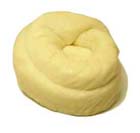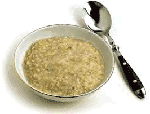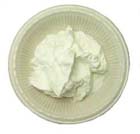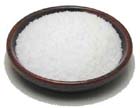|
|
Glossary Selection
Oysters | |||
 | The name oyster is used for a number of different groups of mollusks which grow for the most part in marine or brackish water. Inside a usually highly calcified shell is a soft body. The gills filter plankton from the water. Strong adductor muscles are used to hold the shell closed. Oysters are highly prized as food, both raw and cooked | ||
Oranges | |||
| Oranges are oval to sphere-shaped fruits with leathery, porous skin. Their color ranges from orange to red-orange. Oranges may be confused with other citrus fruits, such as grapefruits and tangerines. However, grapefruits are usually much larger and more yellow than oranges, and tangerines have a more flattened sphere shape than oranges. | |||
Oaxaca Cheese | |||
 | Oaxaca Cheese is a white, semi-hard cheese from Mexican origin, similar to un-aged Monterey jack. Due to its excellent melting qualities, asadero is frequently used as the base for queso blanco (literally white cheese), a dip popular in Mexican restaurants. It is named after the state of Oaxaca, where it was first made. The production process is complicated and involves stretching the cheese into long ribbons and rolling it up like a ball of yarn. It's also known as quesillo, thread cheese when shaped like a ball, and asadero cheese when shaped like a brick. | ||
Oatmeal | |||
 | Oatmeal is a product made by processing oats. In North America, oatmeal means any crushed oats, rolled oats, or cut oats used in recipes such as oatmeal cookies. The porridge made from this is also called oatmeal or oatmeal cereal. However in other parts of the English-speaking world, oatmeal means coarsely ground oats (cf cornmeal, wheatmeal, peasemeal, etc.). In Scotland, oatmeal is created by grinding oats into a coarse powder. Various grades are available depending on the thoroughness of the grinding, including Coarse, Pin(head) and Fine oatmeal. The main uses are: as an ingredient in baking; in the manufacture of bannocks or oatcakes; as a stuffing for poultry; as a coating for Caboc cheese; as the main ingredient of the Scottish dish, skirlie, or its chip-shop counterpart, the mealy pudding. Occasionally it may be boiled as porridge or gruel. However rolled oats or crushed oats are normally used for this purpose nowadays, since they generally cost less. | ||
Kahlua | |||
| Kahlúa is a famous Mexican coffee liqueur. It is heavy and sweet, with a very distinct taste of Mexican coffee, which gives it a dark brown colour. Alcohol content: formerly 26.5%, recently lowered to 20% in most markets to be more compatible with liquor laws in many areas. In 2003 a higher-priced premium product called Kahlúa Especial became available in the United States after previously being offered only in the Duty-Free market. Made with Arabica coffee beans, it has an alcohol content of 35% with lower viscosity and sweetness. | |||
Kale | |||
 | Kale is a form of cabbage (Brassica oleracea Acephala Group) in which the central leaves do not form a head. It is considered to be closer to wild cabbage than most domesticated forms. Tender kale greens can provide an intense addition to salads, particularly when combined with other such strongly-flavored ingredients such as dry-roasted peanuts, tamari-roasted almonds, or red pepper flakes. | ||
Kidney beans | |||
 | The kidney bean is a medium-sized variety of the common bean (Phaseolus vulgaris) with dark red skin. The kidney bean is also known as the red bean, although this usage can cause confusion with the azuki bean. | ||
Kefalotyri cheese | |||
 | Kefalotyri was already well known and respected by the time of Byzantine era. The name comes probably from Greek word kefalo that means hat. This hard, pale golden, yellow cheese has a tang flavor and a sharp aroma, reminiscent of Italian Pecorino Romano. Harder and saltier than Kasseri, Kefalotyri is generally served grated over cooked dishes. The color varies from white to yellow, depending on the mixture of milk. Kefalotyri is described as a male or first cheese to indicate that it is made with full-cream milk. The cheese ripens in two to three months and has a fat content of 40 - 55 per cent. | ||
Kiwifruits | |||
 | also known as Chinese gooseberries, have fuzzy brown skins and sweet, juicy, bright green flesh with a flavor reminiscent of melon and berries. Ripe fruits yield gently to fingertip pressure. Firm fruits can be ripened in the refrigerator. Kiwifruits should be peeled before use; the seeds are edible. | ||
Kosher salt | |||
 | Kosher salt (sodium chloride) is the most commonly used salt in commercial kitchens today. Typically kosher salt, unlike common table salt, contains no additives (for example, iodine). Salt is obtained through various methods, mining inland deposits left from prehistoric oceans, or by evaporating sea water. The latter is typically referred to as sea salt, and has a different flavor than mined salt. Kosher salt can be used in nearly all applications, but it is not generally recommended for baking that uses small amounts of liquid (wet ingredients). If there is not enough liquid, the kosher salt will not dissolve sufficiently, and this can result in small bits of salt in the resulting product. In certain applications this is undesirable. | ||




